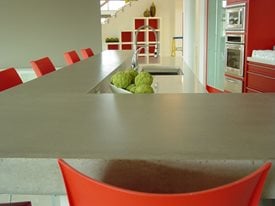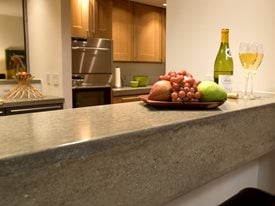
Hard Topix, a division of Nobel Concrete, in Jenison, MI
The typical concrete countertop, whether it’s poured in place onsite or precast in a shop, averages in thickness from 1½ to 2 inches. But that’s just a general guideline. Depending on your design goals and other considerations, you can make your countertops thicker or thinner, if desired. So how do you determine the best thickness for your concrete countertops? Here are some of the key factors to keep in mind.
Weight
Concrete countertops are similar in weight to those made of granite, tipping the scales at about 18.75 pounds per square foot for a 1½-inch-thick countertop and 25 psf for a 2-inch-thick slab. Most kitchen cabinets are sturdy enough to support the weight of a 2-inch-thick concrete countertop, but if you decide to go thicker, you may need to add extra support. It can also be a challenge to lug around a thicker countertop, depending on its size.
One way to reduce the weight of your countertop is to use a lightweight concrete mix, such as enCOUNTER® Concrete Countertop Mix from Moon Decorative Concrete. These mixes are typically formulated with lightweight aggregates and high-performance admixtures to keep the weight down without sacrificing concrete strength and performance. Concrete made with a lightweight mix weighs about 115 pounds per cubic foot compared with 145 pcf for normal-weight concrete.
Learn more about concrete countertop mixes.
Aggregate Size
The size of the aggregate used in the concrete mix also factors into the thickness of a concrete countertop. One rule of thumb that expert concrete countertop maker Buddy Rhodes goes by is to make the countertop at least five times the thickness of the largest aggregate. So for a mix containing 1/4-inch aggregate, a countertop thickness of 1 1/4 inches is the minimum to aim for.
An exception is when using larger decorative glass or other aggregates as accents in the finished surface of the countertop only. Then you can bend the rule a bit as long as the aggregate doesn’t run throughout the entire slab. See How to Embed Glass in Concrete Countertops.
Appearance
Sometimes style is the driving factor when choosing a concrete countertop thickness. If a thicker countertop slab is desired for dramatic or aesthetic purposes, generally the maximum you should go is 3 inches to keep the weight manageable. However, you can create the illusion of a much thicker slab by casting a drop-front edge.

Reaching Quiet Design in Charlotte, NC
This concrete countertop, for example, has an overall thickness of 2 inches but appears to be much thicker because it was cast with a 9-inch-thick drop-front apron, resulting in a countertop that looks like one massive piece of concrete. Learn more about how this countertop was created.
When choosing how thick to make a countertop, also keep these things in mind:
- Molds or edge forms typically come in standard 1 ½ inch or 2 inch thicknesses. So if you want to give your counter a nice bullnose edge, a fancy rope detail, or make it look like split stone or weathered wood, it will need to be the thickness that matches the edge form you’ve chosen.
- If you want your countertop to have an overhang for barstool seating, you may need to cast it a bit thicker so you can include the necessary reinforcement materials.
- Inlays and inserts are another way to customize concrete counters. The size of the items you’d like added to your counters will dictate the required thickness. The same goes for integrated drainboards or trivets.
- The thickness of your countertop may also determine whether or not it requires seams or can be cast as a single piece. If you want a seamless look, talk to your contractor about how to achieve this.
Use of GFRC
How thin can you go with a concrete countertop? By using glass-fiber-reinforced concrete, it’s possible to cast concrete countertops as thin as 3/4 inch while maintaining sufficient strength to resist cracking or breaking. Countertops made of GFRC are also much lighter in weight than those made of traditional concrete, sometimes by as much as 75%.
A number of concrete countertop suppliers sell bagged GFRC mixes that are preblended with alkali-resistant (AR) glass fibers, so you can be assured of the proper dosage. The fibers serve a purpose similar to the steel used in reinforced concrete, adding flexural, tensile, and impact strength.
Read more about GFRC countertops.
Should You Reinforce Your Concrete Countertop?
If you are using GFRC to make a countertop, typically no additional reinforcing is needed because of the material’s inherent strength and ductility. However, countertops made of standard concrete must be reinforced with steel rebar or wire mesh to limit structural cracking and ensure sufficient tensile strength.
When using rebar to reinforce a countertop, it should be no larger than 3/16 inch in diameter and only used in concrete slabs that will be 2 to 3 inches thick. Otherwise, telegraph cracking can occur in the concrete above the rebar. In thinner countertops, good reinforcement options include 9-gauge ladder wire or galvanized wire mesh.
Learn more: Guide to Concrete Countertop Reinforcement.
How thick are concrete countertop overlays?
If you have an existing countertop that you'd like to resurface to look like concrete, an overlay may work. Concrete countertop overlays are applied between 1/8" to 1/4" thick. This thin layer of material is great for redoing old laminate, Formica, tile or wood countertops.
RELATED:
How Thick Should a Concrete Driveway Be?
How Thick Are Concrete Pavers?